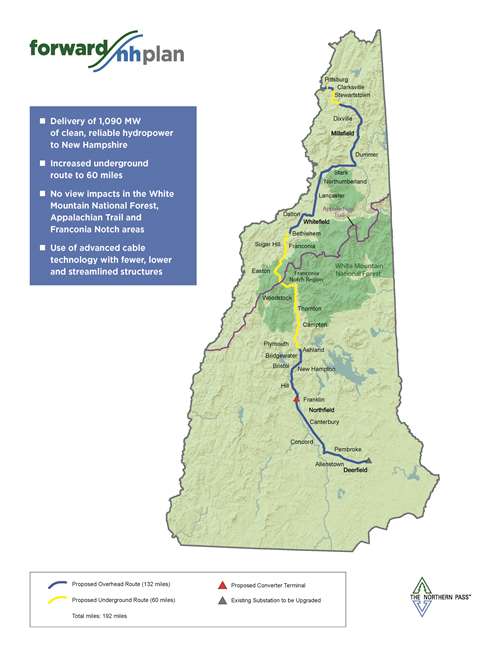Northern Pass Hydropower Project Again Delayed
March 12, 2018

The Northern Pass hydropower transmission-line project isn’t dead yet, but time is running short for the $1.6 billion project.
On March 12, the New Hampshire Site Evaluation Committee (SEC) voted, 5-0, to defer a request to reopen the deliberation process. The committee did agree to suspend its Feb. 1 oral vote to deny the project but only until the written decision is released later this month. A decision on whether to restart hearings won’t be made until May.
The March 12 meeting was held at the request of Northern Pass in an effort to somehow convince the SEC to rehear and reverse its Feb. 1 decision to reject the project. Soon after that vote, Massachusetts, the primary buyer of the electricity, gave the developer, Eversource Energy, until March 27 to salvage the proposal.
“This is just really a Hail Mary effort on Northern Pass’s part,” said Melissa Birchard, staff attorney for the Conservation Law Foundation. “It was a long shot and they knew it. But they just wanted to make an effort to satisfy the Massachusetts’ ultimatum.”
Opponents say the project threatens 95,000 acres of forestland and could harm scenic tourist areas. Small towns fear the project would hurt business and disrupt their communities.
New Hampshire Gov. Chris Sununu endorsed the 192-mille high-voltage system for the jobs and the promise of lower electric bills for ratepayers. He was disappointed that the siting board rejected the project.
Massachusetts agreed to buy a portion of the 1.09 gigawatts of so-called “low-carbon energy” to meet its Clean Energy and Climate Plan for 2020.
In the meantime, the Bay State selected a backup plan, the New England Clean Energy Connect, developed by the Central Maine Power Co., to bring Canadian hydropower to Massachusetts.
There has been no response from the Massachusetts Department of Energy Resources regarding the recent SEC decision to postpone any action on the Northern Pass until May.
On Feb. 28, Eversource Energy filed a request to vacate the SEC’s decision saying it wanted to elaborate on efforts to address the objections to the project. According to Eversource, the impacts on tourism and property values would be offset through payments from a $200 million state fund. Also, Eversource says alternative construction methods would be used lessen impacts on businesses.
Eversource claims the project would create 2,600 jobs during constriction, save New Hampshire ratepayers $62 million annually, add $30 million to state and local tax revenue annually, and reduce regional carbon emissions by more than 3 million tons a year.
The project received good news March 6 when the Canadian National Energy Board approved the proposal, thereby completing the last of the permits for the construction between Eversource Energy and Hydo-Quebec, a Canadian government-run utility.
Eversource issued the following statement after the March 12 decision by the SEC:
“We hope it is an indication that the SEC will evaluate the required statutory criteria, as well as thoroughly consider all of the conditions that could provide the basis for granting approval. At a time when the region needs new and diverse sources of clean energy, it is vitally important that projects like Northern Pass are considered fully and efficiently and without unnecessary delay.”
Categories
Join the Discussion
View CommentsRecent Comments
Leave a Reply
Related Stories
Your support keeps our reporters on the environmental beat.
Reader support is at the core of our nonprofit news model. Together, we can keep the environment in the headlines.
We use cookies to improve your experience and deliver personalized content. View Cookie Settings




Gus Seelig – Executive Director, Vermont Housing and Conservation Board, keynote at the land and water summit seemed to indicate that VT was seriously looking at having the line run through VT.